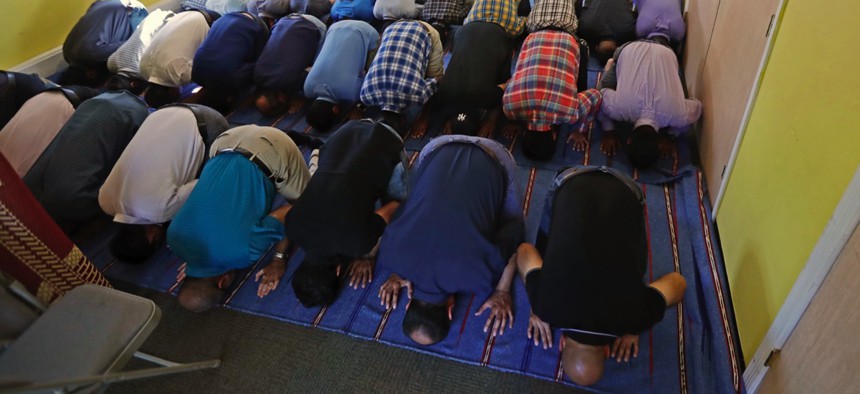This New Jersey Township Tried to Block a Mosque, And Lost

Muslim worshippers pray during a service at the Bernards Township Community Center in Basking Ridge, N.J. (AP Photo/Julio Cortez, File)

Connecting state and local government leaders
Zoning ordinances are one of the most common tools of bias against faith groups. On Tuesday, a New Jersey township settled two cases brought against it.
After five years, 39 public hearings, and two lawsuits, the Islamic Society of Basking Ridge in New Jersey will finally be able to build a new mosque. On Tuesday, the U.S. Justice Department announced the terms of a settlement between the federal government and Bernards Township, the local body that refused to let the Society begin construction on a proposed house of worship based on alleged issues with minor details of its proposal, including the size of the parking lot.
As part of the settlement, the mosque plan will move forward. Leaders of the township will go through training on federal religious-freedom law. And the local board will have to establish new processes for resolving complaints. The settlement also resolves a lawsuit brought separately by the Islamic Society against Bernards Township, which will pay the Society $3.25 million in damages and attorney’s fees.
This case was a particularly nasty and controversial example of a local board discriminating against a religious group that wanted a place to worship. But while the Bernards Township case is distinctive, it’s in no way unique. Religious discrimination in the U.S. often happens in the most quotidian settings, including debates over zoning ordinances.
The New Jersey fight started back in 2012, when the Islamic Society of Basking Ridge announced it would present a proposal for a new mosque to the local planning board. Before the Society had even filed a formal application, evidence of anti-Muslim bias in the community started emerging. Its mailbox was smashed. A neighbor accosted Mohammad Ali Chaudry, the Society’s president, in a parking lot after a township meeting, saying, “Eleven brothers died on 9/11 and now you want to put a mosque next to my house with the insignia of the people who did that,” according to a complaint filed against the township by the Society.
Large crowds showed up to hearings about the proposed mosque. One community member asked whether the facility would be used for animal sacrifices, according to the complaint. The local board heard testimony that the Society’s members were a “different kind of population instead of the normal Judeo-Christian population.” Anti-mosque flyers were distributed. People left nasty comments on articles about the mosque online. Lawn signs protesting the proposal dotted the community.
This went on for years. The Society’s mailbox was even vandalized again in 2014—someone changed the letters “ISBR” to say “ISIS.” Finally, in December 2015, the mosque proposal was officially rejected.
In March 2016, the Society sued the township, arguing that its rejection of the mosque proposal reflected the “religious and cultural animus against Muslims” on display in Basking Ridge. An uncommonly wide range of religious groups came to the Society’s support—from groups that lean left, like the Baptist Joint Committee for Religious Liberty and the Sikh Coalition, to more conservative groups, including the Becket Fund for Religious Liberty and the Ethics and Religious Liberty Commission of the Southern Baptist Convention. “Such unequal treatment of the mosque in this case represents a potential threat to the free exercise rights of each of the amici represented here,” the 18 supportive groups wrote, “and is an affront to our nation’s commitment to religious liberty for all.”
In November of 2016, the U.S. Justice Department filed its own suit, alleging that the Township had violated one of two core federal religious-freedom laws: the Religious Land Use and Institutionalized Persons Act, which prohibits local communities from using vague ordinances and bureaucratic procedures to discriminate against religious groups. On New Year’s Eve, a federal judge in New Jersey ruled that the Society was entitled to judgment on its claims of discrimination, and last week, the township voted to settle the pair of lawsuits.
This case got a lot of coverage, but many suits brought under RLUIPA, as the federal religious-freedom statute is known, do not get as much attention. In the decade and a half since RLUIPA became law, the Justice Department has prioritized action on this kind of religious discrimination, in part because it’s so common. Within just the first 10 years, the department had opened more than four dozen investigations, filed half a dozen lawsuits, and intervened in a number of other cases, according to a 2010 report. This settlement is a big win for the government and for the Islamic Society of Basking Ridge. But there will likely be many cases of its kind to come.
Emma Green is a staff writer for The Atlantic, were this article was originally published.

NEXT STORY: Learning from a long-running digital archive effort




